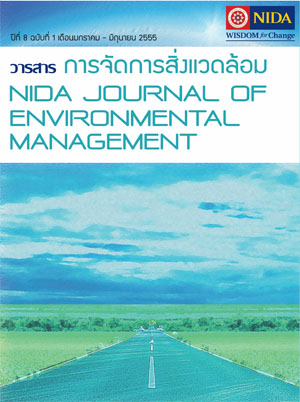เครื่องมือขยายเสียงจากชุมชนผู้ได้รับผลกระทบจากแผนพัฒนาที่ดิน กรณีศึกษาโครงการที่มีความขัดแย้งสูง The Amplification of Voices of Victims of Land Development Projects: The Case of Land Management Controversies
บทคัดย่อ
กระบวนการการตัดสินใจที่เกี่ยวข้องกับความขัดแย้งในการใช้ที่ดินทั้งจาก ฝั่งรัฐและประชาชน เป็นประเด็นที่รัฐในฐานะผู้กำหนดแนวนโยบายและนักวางแผนต่างๆจะต้องคำนึงถึง เพื่อที่จะได้มาซึ่งคำตอบสุดท้ายที่ดีที่สุดในแต่ละสภาพการณ์ แนวทางการใช้ที่ดินนั้นมีความหลากหลายและมีแนวโน้มที่จะขัดแย้งอยู่ บางครั้งโน้มไปทางเพื่อเศรษฐกิจ ซึ่งอาจขัดแย้งกับแนวทางเพื่อสิ่งแวดล้อมหรือเพื่อสังคม ความซับซ้อนของปัจจัยที่มีต่อนโยบายการพัฒนาพื้นที่ในเมืองนั้นสอดแทรกอยู่ ในกระบวนการการตัดสินใจ หลายครั้งผลจากการตัดสินใจนั้น ไม่ได้มาจากความต้องการที่แท้จริงของประชาชน หรือไม่ได้มาจากทุกภาคส่วน และบางครั้งการมีส่วนร่วมกลับเป็นช่องทางในการต่อรองและนำเสนอแนวทางของ กลุ่มผลประโยชน์เพียงกลุ่มเดียว และเมื่อกระบวนการการตัดสินใจจบสิ้นลง และมีการนำเสนอเป็นแผนหรือนโยบายใดๆ หลายครั้งนำมาซึ่งการไม่ยอมรับ ความขัดแย้งจากผู้ที่ไม่มีส่วนเกี่ยวข้องที่ได้รับผลกระทบทำให้นโยบายหรือ แผนนั้นไม่ได้นำสู่การปฏิบัติ เป็นปัญหาและเกิดความสูญเสียเป็นห่วงโซ่กระทบไปในวงกว้าง เช่น โครงการเวนคืนที่บริเวณชุมชนป้อมมหากาฬเพื่อเป็นสวนสาธารณะ โครงการนิคมอุตสาหกรรมมาบตาพุด โครงการแก้ปัญหาน้ำท่วมที่ลุ่มภาคกลาง เป็นต้น งานวิจัยนี้เป็นการออกแบบเครื่องมือที่สามารถสดับเสียงความขัดแย้งต่างๆได้ อย่างทั่วถึง ในทุกๆด้าน โดยเฉพาะเสียงที่ไม่ได้มีศักยภาพเชิงอำนาจหรือเชิงเศรษฐกิจที่จะต่อรองได้ อย่างเท่าเทียมกัน ให้ได้รับการขยายเสียงและสามารถประเมินค่าน้ำหนักเพื่อใช้เป็นแนวทางในการ กำหนดทิศทางการพัฒนาที่ดินอย่างยั่งยืน
The urban land re-development policy decision-making process in Thailand usually involves controversies among the government and multiple stakeholders. The issue concerns reducing further conflict and achieving sustainable development. Most of the controversies involve the diversity of needs and different directions regarding environmental, social, and economic-oriented policy. The voices of the affected residents have been too silent to be heard by the government, and development plans are usually made late and are not possible to be implemented. This research aims to investigate the degree of controversy in three case studies by stressing an integrated approach from all stakeholders. This article presents a Comparative Interest Analysis framework that could be applied to the case studies of Pom Mahakarn Community, Map Ta Phut Industrial Estate, and the Flood Mitigation Plan for the Central Flooded Area of Thailand in order to gather opinions and to analyze them statistically using cross tabulation Chi Square. The relevance of the research is that it can be a communication tool to convince policy makers of the diverse preferences that are usually ignored. Asymptotic significance value (from the Chi Square) should amplify the voices and equalize them as part of the society at the same level as investors, government, and other elites.



